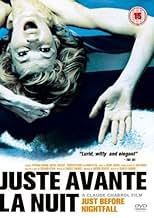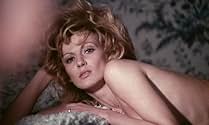NOTE IMDb
7,2/10
2,4 k
MA NOTE
Charles Masson trompe sa femme avec Laura qui est la femme de son meilleur ami François. Un jour, alors qu'elle lui demande de faire semblant de la tuer, il l'étrangle pour de bon. François ... Tout lireCharles Masson trompe sa femme avec Laura qui est la femme de son meilleur ami François. Un jour, alors qu'elle lui demande de faire semblant de la tuer, il l'étrangle pour de bon. François ne tarde pas à découvrir que sa femme le trompait.Charles Masson trompe sa femme avec Laura qui est la femme de son meilleur ami François. Un jour, alors qu'elle lui demande de faire semblant de la tuer, il l'étrangle pour de bon. François ne tarde pas à découvrir que sa femme le trompait.
- Réalisation
- Scénario
- Casting principal
- Victoire aux 1 BAFTA Award
- 1 victoire et 1 nomination au total
Clelia Matania
- Mme Masson
- (as Clélia Matania)
Avis à la une
Possibly the best film Chabrol made, along with 'La femme Infidele' and 'Le boucher'. An intense psychological study and not really a thriller this was the first Chabrol film I ever watched. At first I was left confused and disappointed, however this powerful and moving film slowly revealed it's hidden beauty with each viewing.
This film more than any other of Chabrol's has entered my consciousness, Michael Bouquet's acting is very memorable and Stephanie Audran is astonishingly beautiful. There is no hint of mawkishness or sentimentality and one is left moved and glad of so poignant a masterpiece.
This film more than any other of Chabrol's has entered my consciousness, Michael Bouquet's acting is very memorable and Stephanie Audran is astonishingly beautiful. There is no hint of mawkishness or sentimentality and one is left moved and glad of so poignant a masterpiece.
Though coming from Chabrol's major phase (1967-1975), this was only recently released on DVD – and exclusively on R2 at that!; still, I had missed an incongruous Saturday morning broadcast of the film on Italian TV several years back. Ironically, even if it can lay a claim to being among the director's best-regarded efforts, I admit to having found such lesser-known Chabrol titles as DEATH RITE (1976) and ALICE OR THE LAST ESCAPADE (1977) – both of which immediately preceded this viewing – more readily satisfying
though the fact that JUST BEFORE NIGHTFALL treads typically bourgeois i.e. inherently mundane territory, whereas the others were fanciful (thus essentially lightweight), may have had more to do with this than anything else!
Actually, my main quibble with the film is its overlength (due to the protagonist's wallowing in self-pity, this being basically an update of Dostoyevsky's literary classic "Crime And Punishment", during the last act); in a way, it is also a reversal of Chabrol's own LA FEMME INFIDELE (1969), with the very same stars (Michel Bouquet and Stephane Audran) no less. In the latter she is initially oblivious – and eventually forgiving – of his having learnt about her infidelity and murdered the other man, while here it is he who has a clandestine affair, kills the woman concerned and then confesses to both the wife and his best friend (husband of the deceased and played by Francois Perier), both of whom try to convince the guilt-stricken hero thereafter not to give himself up to the Police (she even taking extreme measures to this end)! Audran, still at the height of her statuesque beauty, is a particular delight and she went on to win a BAFTA award for it (shared for the actress' famously unruffled turn in that Luis Bunuel masterpiece THE DISCREET CHARM OF THE BOURGEOISIE [1972]).
A subplot, then, depicts a comparable folly to the protagonist's – where the elderly and meek-looking cashier in Bouquet's firm embezzles funds to sustain his unlikely romance with a much younger woman (not that the perennially exhausted hero bore the looks of a Casanova himself but, at least, his sluttish mistress is clearly shown to be into sado-masochism). Ultimately, such ironic yet provocative (indeed quasi-surrealist) psychological nuances, are what make Chabrol's work so intriguing and quietly rewarding – more so, in fact, than perhaps any other of the "Nouvelle Vague" film-makers.
Actually, my main quibble with the film is its overlength (due to the protagonist's wallowing in self-pity, this being basically an update of Dostoyevsky's literary classic "Crime And Punishment", during the last act); in a way, it is also a reversal of Chabrol's own LA FEMME INFIDELE (1969), with the very same stars (Michel Bouquet and Stephane Audran) no less. In the latter she is initially oblivious – and eventually forgiving – of his having learnt about her infidelity and murdered the other man, while here it is he who has a clandestine affair, kills the woman concerned and then confesses to both the wife and his best friend (husband of the deceased and played by Francois Perier), both of whom try to convince the guilt-stricken hero thereafter not to give himself up to the Police (she even taking extreme measures to this end)! Audran, still at the height of her statuesque beauty, is a particular delight and she went on to win a BAFTA award for it (shared for the actress' famously unruffled turn in that Luis Bunuel masterpiece THE DISCREET CHARM OF THE BOURGEOISIE [1972]).
A subplot, then, depicts a comparable folly to the protagonist's – where the elderly and meek-looking cashier in Bouquet's firm embezzles funds to sustain his unlikely romance with a much younger woman (not that the perennially exhausted hero bore the looks of a Casanova himself but, at least, his sluttish mistress is clearly shown to be into sado-masochism). Ultimately, such ironic yet provocative (indeed quasi-surrealist) psychological nuances, are what make Chabrol's work so intriguing and quietly rewarding – more so, in fact, than perhaps any other of the "Nouvelle Vague" film-makers.
An extraordinary film. Chabrol turns his keen eye and powers of observation to middle-class morality and psychological torment, never losing his rich sense of humor. The characters are complex and their motivations not always easy to discern. Chabrol views them caustically but also with compassion. It is part of a series of several terrific films he made between 1968 and 1973. Most fans of Chabrol consider this his pre-eminent period, and this film one of his very best.
This is the most morally exquisite of Chabrol's many explorations of the human condition. Guilt, forgiveness, revenge coexist and mutually triumph. Many of us assume these three moral stances are mutually incompatible. Chabrol balances them against each other and then fuses them together. The actors reveal their inner dilemmas with gestures more than words. Deep intentions run across surface motives. And the final gesture of this compelling film casts all that went before into another, deeper level. Of course, no deed is as simple as it seems. But few appreciate as Chabrol does here that our all too common morally mixed motives can continue to coexist to the grave. No evil deed is ever straightforward, but neither are the best ones.
Had Chabrol filmed this in the style of Bergman, this film would be a Criterion Classic. But filmed as a thriller, it has sadly failed to gain the audience and admiration it so richly deserves. It is a philosophical triumph!
Had Chabrol filmed this in the style of Bergman, this film would be a Criterion Classic. But filmed as a thriller, it has sadly failed to gain the audience and admiration it so richly deserves. It is a philosophical triumph!
"Just Before Nightfall" is a slow, grim, gritty, no-nonsense film. It seems as if director Claude Chabrol is saying to the viewer, "Look, don't expect to be charmed or pleased by this film -- that would be pointless for everyone. I'm interested in one thing, and one thing only: the theme of the story. Anything else would be a pointless distraction." If the viewer is willing to go along with Chabrol for the ride, Just Before Nightfall is a rich and moving film.
"Just Before Nightfall" is not a whodunnit, or even a why-dunnit. "It" -- a murder -- kind of just happened, possibly accidentally, and the question facing the characters is: what shall we do about it, now? The lead character knows he is guilty, and his desire to conceal his guilt slowly changes to a desire to confess his guilt. In this, he is like the character of Raskolnikov in Dostoevski's "Crime and Punishment". More astonishing is how his friends and family respond to his confession: they are eager to forgive and forget, to deny and bury the past. And this, in turn, creates an even worse situation for the anti-hero.
1971 was dark moment, politically and culturally. Many films of that year feel like they are suffering from a hangover from the 60s: the time of exuberant exploration and new possibilities has passed, and in its place is a cosmic-scale exhaustion and hopelessness. You see this kind of industrial-strength bleakness in US films like "Five Easy Pieces", "Carnal Knowledge", "Two-Lane Blacktop". If you enjoy 70s bleakness, or, you are interested in guilt and forgiveness, or, you want to watch a director go after his message with an intensely single-minded focus -- then "Just Before Nightfall" is well worth your time.
"Just Before Nightfall" is not a whodunnit, or even a why-dunnit. "It" -- a murder -- kind of just happened, possibly accidentally, and the question facing the characters is: what shall we do about it, now? The lead character knows he is guilty, and his desire to conceal his guilt slowly changes to a desire to confess his guilt. In this, he is like the character of Raskolnikov in Dostoevski's "Crime and Punishment". More astonishing is how his friends and family respond to his confession: they are eager to forgive and forget, to deny and bury the past. And this, in turn, creates an even worse situation for the anti-hero.
1971 was dark moment, politically and culturally. Many films of that year feel like they are suffering from a hangover from the 60s: the time of exuberant exploration and new possibilities has passed, and in its place is a cosmic-scale exhaustion and hopelessness. You see this kind of industrial-strength bleakness in US films like "Five Easy Pieces", "Carnal Knowledge", "Two-Lane Blacktop". If you enjoy 70s bleakness, or, you are interested in guilt and forgiveness, or, you want to watch a director go after his message with an intensely single-minded focus -- then "Just Before Nightfall" is well worth your time.
Le saviez-vous
- AnecdotesThis is the last film of Claude Chabrol's 'Hélène cycle', in which actress Stéphane Audran starred, playing characters called Hélène in La femme infidèle (1969), Le boucher (1970), and La rupture (1970). The only film in the cycle which Audran didn't star in was Que la bête meure (1969), the role of a character called Hélène was instead played by Caroline Cellier.
- ConnexionsVersion of L'étranger à l'intérieur d'une femme (1966)
- Bandes originalesSilent Night
Original lyrics by Joseph Mohr and music by Franz Xaver Gruber, French lyrics by unknown lyricst
Played and sung in the Christmas morning scene
Meilleurs choix
Connectez-vous pour évaluer et suivre la liste de favoris afin de recevoir des recommandations personnalisées
- How long is Just Before Nightfall?Alimenté par Alexa
Détails
Contribuer à cette page
Suggérer une modification ou ajouter du contenu manquant






























